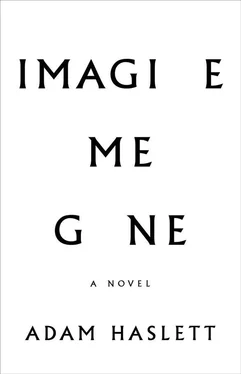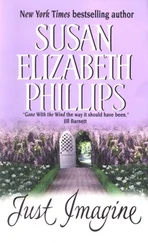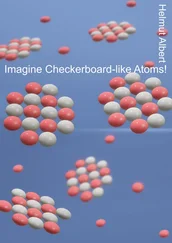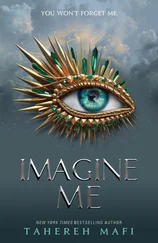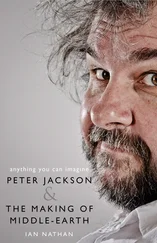Eventually a détente was achieved. The awful precision of things drifted off to one side. I drove around for a while, walled up in sound. About the music I had listened to since I was a child, my father had never said much. His own tastes were a mixed bag, baroque numbers he’d picked up in the Church of England, Elgar and the grand imperial fade-out, tossed in with Sinatra and Frankie Laine. But whenever “Bridge Over Troubled Water” came on the radio in the car, my mother would remind us that it had been one of his favorite songs, and it had often occurred to me that he had done something like that, laying himself down over the trouble he himself had become, so that we could pass on. I wondered how any of them — Celia or Alec or my mother — managed to live anywhere but on the lip of his grave, eyes pinned open, trying to look away. How were they not cold to the touch of anyone but those, like my father, like Bethany, who ended who you were by making you over again in their image?
There is just the one sequence: Stepping from the terminal at Logan into that furnace heat on the afternoon I arrived home from England with Peter Lorian, my undershirt soaking through before we crossed the parking lot, the glint of the sun on those car roofs, the blue sky and molten asphalt, all perfectly unreal and incredibly precise. Arriving at the house, seeing my mother with her arms open to hug me, her hugging me, my being impervious to her touch. Then watching the three of them cry in the living room, wanting to comfort them but not knowing how, sealed off and sure only of this: I left them here to suffer and now he is gone. The one sequence. Like a groove on a record cut too deep for the needle to climb out of. No matter what else is playing, this is always playing. That is the point of volume — to play something louder than this groove. The volume of speakers, or of obsession. The power of the sufficient dose.
The drizzle and headlights, the storefronts and street signs — they all ran into one another, softening things up. When I knocked on the front door of the house, it was Jaylen who answered. Hey, he said. We don’t have the program today, do we? No, we don’t, I said. And then, realizing I needed to say something more, I added, I just wanted to thank you for the meal last night, I was so glad to be here. No problem, he said, peering at me with some concern. My mom isn’t home yet, if that’s who you came for. No, no, I said, I just thought I’d drop by. Maybe it was true after all that I would never be with anyone romantically. That my anguish, which for a time had specialized in love, had once more become indivisible from the rest of life. In which case relief might come from elsewhere. Standing in front of me in the entrance, Jaylen was uncertain how to proceed. I’m sorry I don’t have any records for you today, I said. That’s all right, he said, you’ve given me a bunch. I can give you more, I said, many more. You need some kind of hood, he said. I looked up and felt the rain on my face. You’re right, I said, I do. Is it okay if I come in?
He had a Technics turntable in his room set up on milk crates filled with vinyl. There was the requisite Tupac poster, and the one that I’d given him from Run-D.M.C.’s first album, with Simmons and Smith in fedoras and tracksuits up against a brick wall. The bedsheets were still red Mickey Mouse. His schoolwork was piled on his dresser, his clothing on a beanbag, which he cleared for me to sit on. I picked something up yesterday you might like, you want to hear it? he asked. Please, I said, carry on. It was an Indochina remix of Kaci Brown’s “Unbelievable.” The original (hardly the right word) was a catchy, overproduced bit of Nashville hit-making, the kind of track that still gets called R&B though it’s sung by a white teen from Sulphur Springs, Texas, and has neither. But Indochina (aka Brian Morse and A. Fiend) had stripped away the lip-gloss piano and session-music guitar, laying the vocals down over a four-to-the-floor beat straight out of 1979, but quickened to the pace of a Rotterdam gay night. I couldn’t help but nod my head up and down, as Jaylen did, listening to this thoroughly unremarkable voice engineered to the vanishing point, and yet, when driven by the drum machine and lofted on waves of synth, still reaching the note that the heart pines for.
It’s unbelievable but I believed you
Unforgivable but I forgave you
Insane what love can do
That keeps me coming back to you.
It’s kind of gay, he said. I wouldn’t play it at school, but it’s got a kick, huh? Kind of gay? I wanted to say. Do you have any notion how many homosexuals sweated their asses off on the dance floor to make this soaring bit of derivative trash possible? How many died of AIDS, OD’d, or went broke on the way to that girl from Texas cutting a deal with Interscope to record a track that achieved its own unwitting ideal only when most of it was torn away by the people who really needed it? Any idea of how much eloquence was borrowed to pay that royalty? But it seemed like a lot to go into just now, and I felt as at rest as I had in a very long while, sitting in Jaylen’s room with him, with the turntable and the records, talking about music. As if he were my friend and I was his. Yeah, was all I said, it’s definitely got a kick.
He put on the Darqwan twelve-inch I’d suggested to him the day we met, “Rob One 7,” a cavern of distorted bass filled with an assaultive drum line and haunted now and then by a laserlike phrase of keyboard. As good a sonic portrait of postindustrialism — or at least of unemployment in Sheffield — as one was likely to come across. Knowing his speakers weren’t up to the task, Jaylen plugged in his headset and handed it to me while he flipped through a crate looking for what to play next. I slipped into the cavern and disappeared.
Here at last I could track the ghosts by ear, listening to them dance in the cut, the lost coming alive again in the vibrations of my skull, and through my whole body, which was free now to be nothing more than a tunnel, a passageway for the missing to travel back along, the music bringing them home.
Can I ask you a question? Jaylen said, when the track had ended. Sure, I replied. How come you told my mom you have kids? You don’t have kids, do you? No, I don’t, I said. I guess I just didn’t want to disappoint her, she seemed to like the idea. But don’t worry, I said, it’s nothing romantic toward your mom, I just felt at home. I’m sorry if I let you down. The wall of the booze was beginning to disintegrate. I could feel it washing away and the dread rolling in behind it, lapping at the tips of my nerves.
You’re strange, he said, cueing up another dubstep record, this one on a lower volume. He took a seat at his desk and scrolled through something on his phone. I should go, I thought. But the idea of getting up and leaving the house was terrifying. If I stayed here, in his company, I might knuckle through. They would cook dinner, I could eat with them. The overhead light, the grated cheese. It could be ordinary. My eyes started to twitch, as if I were caught in a waking dream. At the ER, they would think I was just a drug seeker.
The door opened and Jaylen’s mother appeared. She looked across the room at me, prone on the beanbag, my body beginning to shake, and I could tell by the alarm on her face that it was getting late, that things were already far along, and that I would need their help.
It’s terrible how dry the ground has become. The brook is down to a trickle and the thistle and ferns along its banks look almost wintry. All of July and August it hardly rained, not even on the muggy days when thunderheads came through in the afternoon and lightning flashed in the distance. I had to water most evenings. It's the middle of October now and I’m still watering to keep the soil of the beds damp and the bushes from withering. Yet for all this, these last few weeks have been the most glorious weather, cloudless skies and temperate days, perfect for being out like this in the morning, and in the early evenings during the week, when I get home from work. The light is so clear in autumn.
Читать дальше
